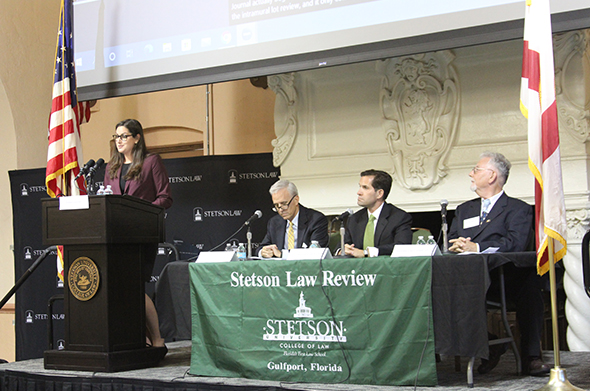Judges, FL Supreme Court Justice Talk Clerkships at Stetson Law

If all the intensive reading, research, writing, and analysis law school entails leaves a 3L wanting more, members of the federal and state judiciaries in Florida want to hear from them.
That was the big takeaway from an engaging panel discussion at Stetson Law hosted by Stetson Law Review. Judges from a range of backgrounds and jurisdictions gave the audience a glimpse of what a judicial clerkship looks like in their courtroom.
Judicial clerkships are generally one- or two-year positions – but some are longer. They involve working closely with the judiciary to conduct research, write memoranda, draft decisions, and discuss ongoing cases with judges and other clerks. Most judges have one or two clerks, though some have a pool of several attorneys often referred to as staff attorneys.
For a recent law school graduate or working legal professional exploring a potential new direction, the position can be a capstone to one’s legal education, a critical career launching (or turning) point, and an immersive look at how judges operate. The judges on Tuesday’s panel went into detail on what that looks like day to day and how it can benefit one’s entire career.
Insights on judicial clerkships from high-caliber officials
Speaking to an audience consisting of dozens of students who work on the Law Review, Kathryn Alkire, the publication’s editor-in-chief, introduced the panel’s four judges: Florida Supreme Court Justice John D. Couriel; Hon. Charlene Edwards Honeywell, District Judge for the United States District Court, Middle District of Florida; Hon. Christopher J. Tuite, Magistrate Judge for the United States District Court, Middle District of Florida; and Hon. Craig C. Villanti of Florida’s Second District Court of Appeal (who is also a Stetson Law alumnus; J.D. ’77).
Each spoke candidly about what their judicial clerks do, the lifelong connections they develop with them, and how they vet candidates for the role.
“It’s really a fun job because every day you come in and solve a puzzle. And the beauty of the job, which you’ll never find again unless you ascend to the bench, is your sole objective is to do the right thing,” Judge Tuite said.
The panel was moderated by Law Professor Louis Virelli III, who noted how rare it is to hear directly from such high-profile judges and reflected on his own experience as a judicial clerk.
“I also had the absolute distinct pleasure of being a clerk twice myself at the district court and circuit court levels,” he said. “They were the two best jobs of my life prior to this one – but it’s still close. It really is an extraordinary opportunity.”
Unforgettable role, lifelong connections through mentorship
While the position is heavy on research and writing, it also brings those in it face to face with the inner workings of a courtroom – a valuable experience for any legal professional at any point in their career. They can see what makes a good lawyer, what makes a less effective one, and even how and why high-profile cases unfold the way they do.
“I like to refer to the trial court as the court where all of the action is, and so our clerks not only get to do research and writing, they also get to observe,” Honeywell said.
The panelists stressed how clerks play a critical role in assuring the judiciary gets it right in their decisions, thereby ensuring a courtroom is delivering on the promise of justice for all.
“I tell my law clerks that their first job is to protect me from error. It really is that simple: save our court from error. And therefore, it is a critical job,” Justice Couriel said. “It involves a lot of diagnosis. It involves a lot of figuring out what the law tells us about how a particular case or controversy ought to be solved.”
Trust is a centerpiece of a judge’s relationship with their clerk, Couriel added. While the days may be long and the pressure high, a lifelong alliance develops over time.
“While the term of the job is only a year, I really view the job as a lifelong commitment,” he said. “My law clerks have me in their corner for the length of his or her career.”
While the justice and judges shared details unique to what the role entails in their courtrooms, one common thread persisted: a knack for legalese and a love for the written word are paramount.
“Being on law review is the perfect segue into being an intern or a law clerk because you do what we do: read, research, write,” Villanti said. “It’s what you do, 24/7. It’s all you do. I used to read a thing called books. I don’t read books anymore. I read briefs.”
To explore more ways Stetson Law students can develop their ideal career path while still in school, visit the college’s Office of Career and Professional Development website. Learn more about Stetson Law Review.
Post date: Oct. 28, 2022
Media contact: Kate Bradshaw
[email protected] | 727-430-1580